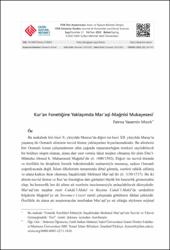Kur’an Fonetiğine Yaklaşımda Mar‘aşî-Mağnîsî Mukayesesi
Künye
MISIRLI, Fatma Yasemin. "Kur’an Fonetiğine Yaklaşımda Mar‘aşî-Mağnîsî Mukayesesi." FSM İlmi Araştırmalar İnsan ve Toplum Bilimleri Dergisi, 21 (2023): 381-417.Özet
Bu makalede biri hicri X. yüzyılda Manisa’da diğeri ise hicri XII. yüzyılda Maraş’ta
yaşamış iki Osmanlı aliminin tecvid ilmine yaklaşımları kıyaslanmaktadır. Bu alimlerin
biri Osmanlı kıraat çalışmalarının altın çağında imparatorluğun merkezi sayılabilecek
bir beldeye nispet olunan, alana dair eser vermiş fakat meşhur olmamış bir alim Ebu’lMünteha Ahmed b. Muhammed Mağnîsî’dir (ö. 1000/1592). Diğeri ise tecvid ilminde
ve özellikle bu disiplinin fonetik bahislerindeki maharetiyle tanınmış, sadece Osmanlı
coğrafyasında değil, İslam ülkelerinin tamamında ikbal görmüş, eserleri tahkik edilmiş
ve alana katkısı ikrar olunmuş Saçaklızâde Mehmed Mar‘aşî’dir (ö. 1150/1737). Bu iki
alimin tecvid ilmine ve Kur’an fonetiğine dair görüşleri büyük bir benzerlik göstermekte
olup, bu benzerlik her iki alime ait eserlerin incelenmesiyle anlaşılabilecek düzeydedir.
Mar‘aşî’nin meşhur eseri Cuhdü’l-Mukıl ve Beyânu Cuhdi’l-Mukıl’de serdedilen
bilgilerin Mağnîsî’ye ait Terceme-i Cezerî isimli çalışmada görülmesi dikkat çekicidir.
Özellikle de alana ait araştırmacılar tarafından Mar‘aşî’ye ait olduğu söylenen orijinal fikirlerin, vefat tarihi kendisinden 150 yıl evvel olan Mağnîsî’nin risalesinde müşahede
olunması, bu iki alime ait risalelerinin karşılaştırılması, kaynak analizinin yapılması ve
birlikte değerlendirilmesi durumunu zaruri kılmıştır. This article will present a comparative examination of the research approaches used
by two Ottoman scholars from the same discipline, one of whom lived in Marash in the
12th century, the other in Manisa in the 10th century. Sachaklizade Mehmet Mar’ashī
(d. 1150/1737) was known for his mastery of the science of Quranic recitation and its
phonetics not only in his region but within all the Islamic lands. His work has been
carefully studied, analysed and is widely acknowledged. The latter scholar on the other
hand, Ebu’l-Munteha Ahmed b. Muhammed Magnīsī (d. 1000/1592) is an unknown
scholar who also contributed to the same field. He was associated with Manisa, a town
that could be considered the centre of the empire during the golden age of Ottoman
recitation studies. A great similarity is evident in both their work regarding the points
and manners of articulation and hence, the phonetics of the Quran, and this similarity can
be analysed by examining both works. It is noteworthy that the information presented
in Mar’ashī’s famous works, Cuhdu’l-Mukıl and Beyanu Cuhdi’l-Mukıl, can be seen in
Magnīsī’s Terceme-i Cezerī. In particular, the fact that the original ideas, which are said
to belong to Mar’ashī by researchers in the field, are observed in the treatise of Magnīsī,
whose death date is 150 years before him, has made it necessary to compare the treatises
of these two scholars, to analyze their sources and to evaluate them together.



















